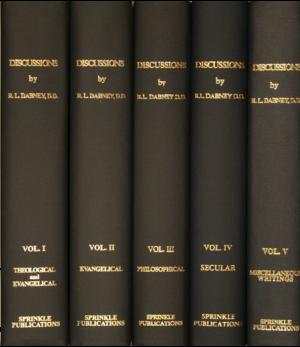
The great Southern Presbyterian theologian Robert Lewis Dabney has been mentioned a number of times on this site. It is a very telling indication of our times that such a visionary man is so little known, and usually slandered when mentioned at all. You can find the entire collection of his written works at the Dabney Archive, all of which are well worth reading. However, such a massive undertaking can be a bit overwhelming, and so on Sundays I have begun posting bite-sized excerpts from Dabney’s works with perhaps a little bit of my own commentary. This will be done in hopes of promoting wider readership for this great man. You can find links to all the previous “Dabney on Sunday” posts at the bottom of this post.
The following excerpt is taken from a sermon preached by Dabney in December 1862 commemorating the death of a Confederate officer, entitled “The Christian Soldier.”
The duties of patriotism are not prominently urged in sacred Scripture. This we account for, not by supposing, with a certain sickly school of moralists, that this sentiment is selfish, narrow or inconsistent with the broadest philanthropy; but by the facts, that the obligations of the citizen are not directly religious, and that they are so natural as to require little inculcation. The Hebrew Scriptures do indeed say enough, as in the text, to justify an intense love of native land and its institutions. Civil government is God’s ordinance, and if it be just, one of his greatest temporal blessings. The diversity of tongues, characters, races and interests among mankind forbids their union in one universal commonwealth. The aggregation of men into separate nations is therefore necessary; and the authority of the governments instituted over them, to maintain internal order and external defence against aggression, is of divine appointment. Hence, to sustain our government with heart and hand is not only made by God our privilege, but our duty. Our best way to advance the well-being of the [human] race is to advance that of the portion of our [human] race associated with us in the same society. He who extends his philanthropy so broadly as to refuse a special attachment to the interests of his own people, will probably make it so thin as to be of no account to any people.
I therefore believe that there is nothing opposed to an enlightened Christianity in a warm patriotism for our particular country. This feeling is made up of several elements: a legitimate regard for our own welfare and worldly estate, interest in that of our families, and a wider benevolence towards our fellow citizens; together with an honest pride in the glories of our history, and in the justice of our institutions, with the attachments of local affection to the very scenery and soil of our native land. . . .
It is even more appropriate to us than it was to the Greek to sing: “Glorious his fate, and envied is his lot, Who for his country fights, and for it dies;” for we contend, not only for the lawful interests of home and country, but for the more precious and sacred cause of God and of souls. I am not one of those who hold that these sentiments are the birth only of pagan ferocity, or unholy pride. The principles of personal honor and the love of glory have been perverted among us into a code of wickedness and bloody retaliation, for which we now doubtless suffer the chastisement of an offended God. From this abuse the professors of a spurious and debased puritanism have taken occasion to decry all such sentiments until they seem to be vanished from among them; and the vileness of public morals, which is the consequence of this extreme, has become as loathsome as the other was violent. But there is a true glory and a true honor, that which cometh from God and not from man: the glory of duty done, of obstacles overcome, of fears resisted, and of generous sacrifices made to a worthy cause, the honor of an integrity of principle stronger than the sense of pain or the fear of death. He deserves most of this honor who from pure motives braves the direst evils and pays the costliest sacrifice for the noblest object. . . .
Such applause [for patriotism], when nobly won, is valuable; it is ennobling. It is an inheritance of honor to the children who emulate the virtues that won it. Is there one who “hath the stomach and mettle of a man” that would not rather leave his sons freemen, enriched only with this heritage, won for them by a father’s blood, than wealthy slaves? And is there a true woman who would not elect, heart-rending as it might be to make the election, to be the widow of such a Christian hero than to live in the embraces of a dishonored and abject man, the serf of despots?
Previous Dabney on Sundays:
Universal Suffrage
Abstractions
Redefining Terms
False Philosophies
Abolishing Religion
Cruelty of Humanitarian Philanthropy
Southern Slavery
Labor Unions
Secularized Education
| Tweet |
|
|
|




